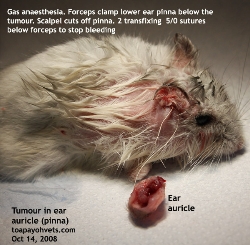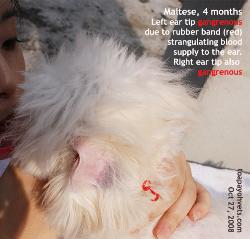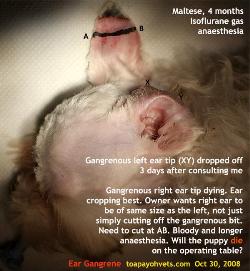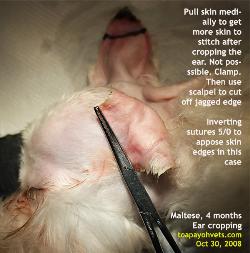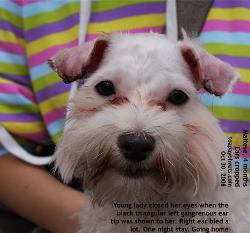"I tied her ear tips with a rubber
band," she had watched and adopted the same procedures done in a Korean
TV program on Malteses. Shih Tzus do get their long hair tied up above
their forehead so that they can see and look pretty.
"The blood supply to the ear tips is no more," I explained. "The ear
tips have no blood supply due to the rubber band cutting off the flow of
blood. Now the tissues are dying. This is called gangrene. Did you use a
groomer's rubber band for Shih Tzus?"
"No," the lady showed me a red rubber band normally used for tying
things.
What to do with these two dying ear tips? Nothing much could be done to
reverse the cell death.
3 days later, the young lady came as the left ear tip had become black
and hard. I asked Groomer Aung to clean it.
"The ear tip dropped off," Groomer Aung showed to the dead triangular
piece to me and the lady owner. She cupped her hands to cover her eyes.
It was too much for her to see.
I took away the gangrenous ear tip. What to do now?
"The right ear tip is becoming black," I showed the owner. "It will also
drop off in a few days' time. I advise cutting it off now."
"How much it will cost me?" the lady had a tight budget as she was
studying in Singapore. Many foreign students in Singapore survive on a tight budget as their
middle class parents skim and save every penny to pay for their
expensive undergraduate fees and accommodation overseas. Hoping that
their progeny would pass their examinations, take their studies
seriously and graduate. Get a better future with a university degree.
Such are the high hopes of parents.
In theory, such students ought not keep any dogs to minimise expenses.
But they are not from the frugal baby-boomer generations that have had
experienced the deprivations of World War Two. So, some of these
Internet Generation young adults do buy puppies and they do make great companions in
a foreign land where friendships are transient. If pet dogs don't
fall sick, expenses are affordable.
"$60.00 to cut off the gangrenous right ear tip," I said. It was take
less than 10 minutes of anesthesia and cutting off the tip would be two
seconds. Potassium permanganate powder applied on the wound would stop
bleeding. Hence the quotation was low.
"Can you make both ears of the same size?" the fair lady assumed that
cutting off a larger piece of the right ear tip instead of the small
gangrenous tip would be the same effort and expenses.
To the owner, aesthetics are important. Which owner wants to see her
companion with uneven sized ears every morning? Friends would ask
awkward questions too.
I assessed this fair Korean lady's parents must be giving her sufficient funds to study
and little else. Certainly
not to own a puppy in expensive Singapore. Fortunately she did not buy a
car in Singapore. But taxi fares to the veterinarian for a budget
conscious pet owner do add up and increase her expenses. Pet dogs are not
permitted on buses and the subway in Singapore and so taxis are the sole
transportation for her sick pet going to the veterinarian.
I did not explain that it wound take 20 times longer to give Gom ears of
equal sizes. Anaesthesia would need to be longer. The left ear tip
needed to be cut again to get rid of the gangrenous edge. The right ear
tip with a much small gangrenous patch needed to be measured and cut to
the same size and the left ear tip. There would be stitching and lots of
bleeding. The total time taken would be so much longer. Therefore, the veterinary fees would be much more
at around
$300.
As she was on a tight budget, I did not revise my original fees.
Gom needed surgery now. She could still survive after both gangrenous
ear tips dropped off but it would be quite distressful for his owner to
experience the sight of right dead ear tip falling away in a few days.
I masked him and tubed him to give him the
isoflurane gas anaesthesia. He did not sleep well under intubation and
was gagging as if he did not like the endotracheal tube.
The anaesthesia was uneven and delayed my surgery. I had to worry
whether he would die on the operating table since he could not get to
the surgical stage of anaesthesia unlike other puppies.
When I took out the endotracheal tube and just gave him gas via the
mask, he slept like a baby. The gangrenous left ear tip was placed
against Gom's right ear to get the area to be cut. I drew the incision
line with a marker pain. Pulled back some skin so that I could suture
over the cut cartilage. It was not possible in Gom as her skin was taut.
A curved artery forceps was clamped below the black marker line and the
cartilage was covered with an inverting 5/0 absorbable suture, as in
stitching the uterus during Caesarean sections.
The left ear tip was clamped and
similarly cut to remove the gangrenous edges and dead cells. There was
much less bleeding and the suturing stopped the bleeding. The right ear
tip area bled a lot as it was normal tissues cut by me to ensure that
both ear had equal sizes. The bleeding was not serious, so I did not
bandage up the right ear to stop the bleeding. I would have had done in
a Doberman after ear cropping.
Ear cropping by vets for cosmetic reasons is prohibited in Singapore in
the past decade or so. However, it was not prohibited when I started
practice some 25 years ago.
"Gom has to stay one night for observation," I said to the fair lady as
she would not be used to the bleeding over the side of the right ear and
onto the ear. "Gom would be active at home causing more right ear
bleeding."
Gom would keep her owner awake the whole night. She would be worried
about the bleeding as Gom would be active. Both would not sleep. Gom's
owner might dial for emergency veterinary treatment. This would
considerably increase her expenses. By staying overnight at the Surgery,
Gom would just rest, eat and sleep. Not being active, the bleeding would
stop naturally.
"How much does it cost me?" the lady asked. As the $10.00 was
affordable, she agreed.
Early the next morning at 9 am, the lady suddenly appeared while I was
starting my work.
Well groomed and attired
in a striking multi-coloured striped blouse she always presented well
whenever I saw her at the Surgery. No casual T-shirts. First impressions
are important for her.
Gom's bleeding had stopped but large brownish red blood clots that have
had dried up blanketed the top of her forehead and the sides of both
ears. I took wet tissue papers to wipe away the
blood clots on top of Gom's head and side of her right ear while Gom's
owner watched.
"What does 'Gom' mean in Korean?" I thought this Maltese might be named
after one of the gnomes in the 'Lord Of The Rings' movies. This young
mini-Maltese was no ageless and deformed dwarf guarding her mistress'
treasures.
"'Gom' means 'Bear'" the young lady in her early twenties taught me my
first word in the Korean language. She scrutinised the puppy's ears
without saying a word. I presumed she was satisfied with the almost
equal sizes of the ear tips bordered with dark red brown clots.
I had
her holding Gom take a good photograph for the reader's appreciation and
for record purpose. As Gom had not scratched his ears, I did not
recommend an Elizabeth collar.
Bathing of the ears would only be
done10-14 later. Antibiotics would be taken for 7 days.
It is hard times in November 2008. The big bankers played around with
financial derivatives and caused considerable damages to ordinary
people. Gom's owner need to save every dollar as her parents have a
limited budget for her to get a good degree in Singapore and be
proficient in English.
Once she graduates, her parents would be able to
worry much less. To save money, I used absorbable sutures during skin
suturing so that Gom's owner need not return for stitch removal. The sutures would dissolve, saving Gom's owner some
money in taxi fares. I expect Gom to be all right and hope that her
owner will be more careful when prettying up Gom with rubber bands.
NOTES: General anaesthesia of puppies under 3 months of age can
be risky according to some veterinary reports. Gom was 4 months of age
but still there was the worry.
 TOA
PAYOH VETS
TOA
PAYOH VETS